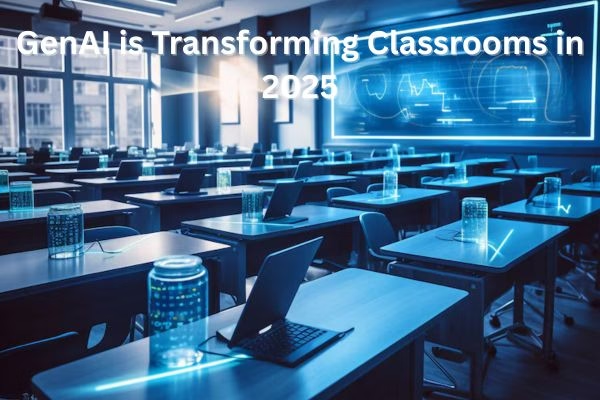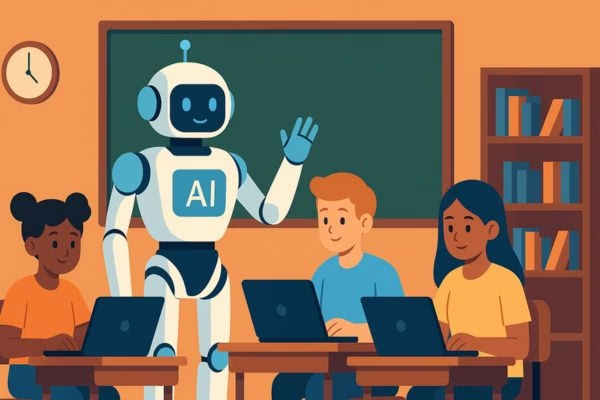AI in Education 2025 is revolutionizing both teaching and learning by introducing intelligent technologies into the classroom. Traditional learning tools like chalkboards and textbooks are being complemented. With the rapid evolution of artificial intelligence, especially Generative AI (GenAI), classrooms are being reimagined. From personalized tutors to AI-driven assessments, GenAI is becoming a transformative force in both traditional and digital education systems.
In this blog, we’ll explore how GenAI is revolutionizing education, the practical applications seen in classrooms, tools you can try, and the ethical challenges it introduces.
What is GenAI and Why It Matters in Education
Generative AI is a form of artificial intelligence capable of producing original outputs such as text, images, videos, or code by learning from vast datasets during training. Unlike traditional AI, which focuses on automation or decision-making, GenAI generates original outputs, making it uniquely useful in educational settings.
Why It Matters: AI in Education 2025
- Creativity boost: Students can co-create content with AI.
- Personalized learning: Adaptive learning paths powered by AI.
- Teacher support: Less time spent on grading and lesson planning.
Popular GenAI tools include OpenAI’s ChatGPT, Google Gemini, Khanmigo (by Khan Academy), and MagicSchool.ai.
Top 5 Ways GenAI is Transforming Classrooms in 2025

1. Personalized Learning Assistants
AI-powered tutors can provide 24/7 academic support. Platforms like Khanmigo and ChatGPT help students understand complex concepts at their own pace.
2. Automated Lesson Planning & Grading
Teachers are using tools like Eduaide.AI and ScribeSense to auto-generate lesson plans, quizzes, and grade essays quickly—saving valuable time.
3. Inclusive Education
GenAI is breaking barriers for students with disabilities or language challenges. AI can translate, convert text to speech, or provide visual aids on demand.
4. Creative Collaboration
Students now write poems, generate storyboards, and create science models with AI as a co-creator, enhancing engagement and exploration.
5. Smart Assessments
AI-powered assessment tools adjust quiz content and difficulty levels dynamically, depending on how a student performs in real-time—resulting in more personalized and effective evaluations.
Global and Indian Impact: Real-Life Use Cases
India:
- NEP 2020 encourages tech integration and AI literacy.
- Andhra Pradesh has piloted AI-enabled learning in government schools.
- Delhi partnered with Google for AI curriculum integration.
Global:
- UAE: Launch of AI-first schools in Dubai.
- Finland: AI introduced in early childhood education to foster creativity.
These initiatives show how GenAI is going mainstream in policy and practice.
Challenges and Ethical Concerns
While promising, GenAI in education comes with challenges:
- Data Privacy: Student information must be securely managed.
- AI Bias: AI-generated content can reflect unintentional biases.
- Overdependence: Students may misuse AI for assignments.
- Teacher Training: Educators need guidance to integrate AI responsibly.
GenAI should support—not replace—educators.
Top Free Tools to Try in 2025
| Tool | Purpose | Free Access |
|---|---|---|
| ChatGPT | Tutoring, idea generation | Yes |
| Khanmigo | AI learning assistant | Limited Free |
| Eduaide.AI | Lesson planning | Freemium |
| GrammarlyGO | Writing improvement | Freemium |
| Socratic by Google | Homework help | Yes |
These tools enhance interactive learning by helping educators streamline their efforts and enabling students to explore concepts in more engaging and personalized ways.
Conclusion – AI in Education 2025
Generative AI is not a passing trend—it’s a foundational shift in how we approach education. AI in Education 2025, In 2025 schools that embrace GenAI not only enhance learning outcomes but also prepare students for a future powered by creativity, technology, and collaboration.
As we move forward, it is essential for educational institutions to focus on responsible AI integration. This includes proper training for teachers, curriculum updates, and clear ethical guidelines to ensure AI tools are used effectively and fairly. With thoughtful implementation, GenAI has the power to unlock new levels of academic excellence, making learning more meaningful, inclusive, and personalized for all.
Top 5 Education Systems in 2025: Future-Ready Countries Ranked
Are you ready to bring GenAI into your classroom?








